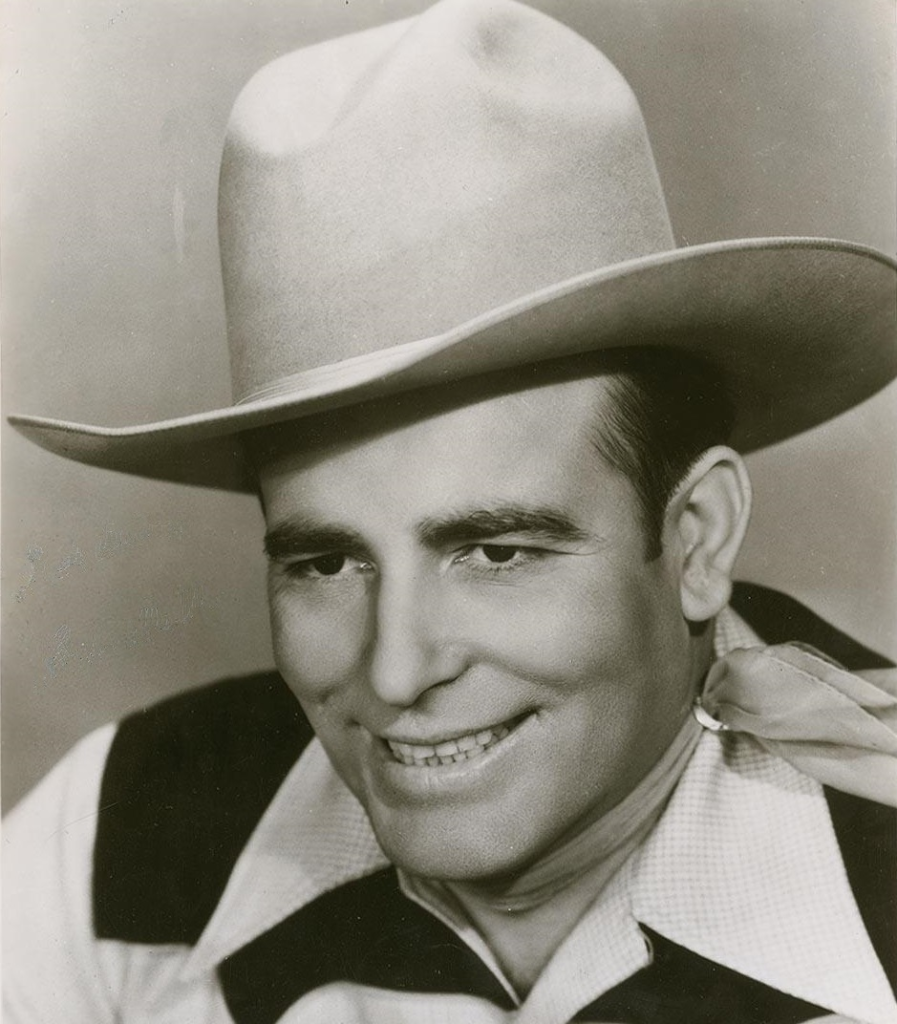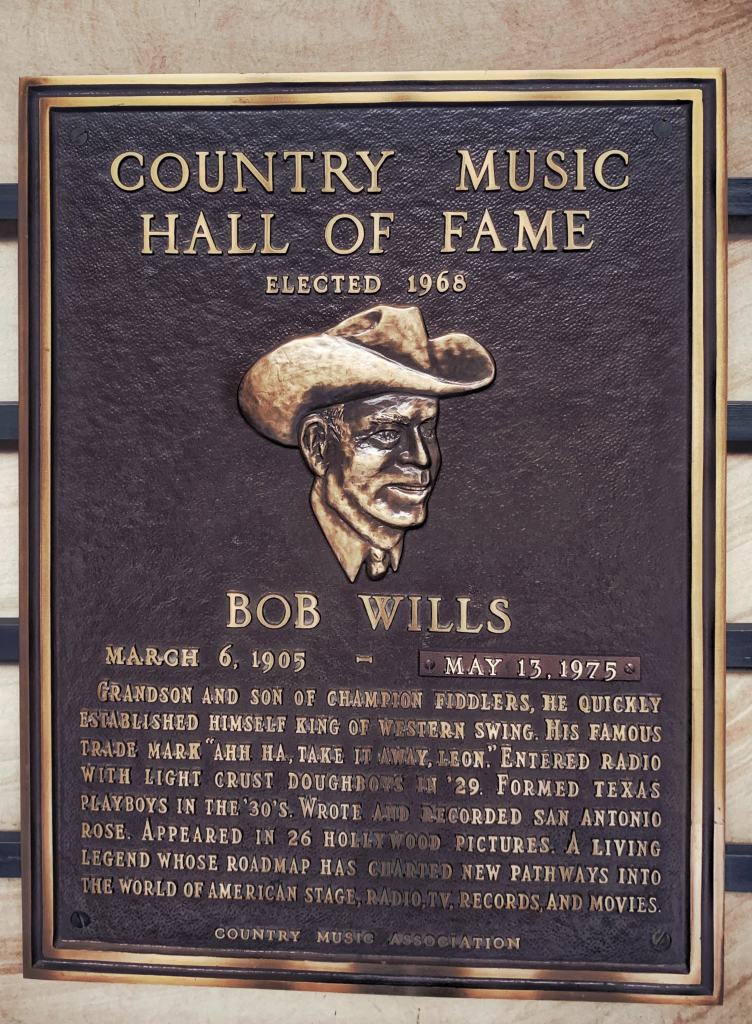
Bob Wills is known as one of the pioneers of western swing alongside Milton Brown. He is known for his signature “AH…HAHH!” in all his songs while mixing together ragtime, blues, and fiddle sounds to create what is known as western swing
Bob Wills was born in Turkey, Texas, on March 6, 1905, and is located in the North Western area of Texas. Both his parents were fiddle players, and he grew up in an area famous for Black musicians such as Bessie Smith, an early African-American blues legend. From his surrounding neighbors and migrant workers, he learned blues and jazz, which would later influence the creation of the western swing sound. He left his parent’s home at age seventeen and drifted around from to job while also playing and performing in traveling medicine shows. The medicine shows, however, he often wore blackface makeup appearing in comedy routines during the show while he played his fiddle and sang.

In 1930, singer Milton Brown and Wills teamed up when they were hired by W. Lee O’Daniel to promote mill’s Light Crust Flour on the radio, where they performed as Light Crust Doughboys. After Milton brown quit the band in September 1932, Wills formed his own band. He took with Tommy Duncan (who had replaced Milton Brown as a Doughboy). After a short period of playing in the Wico area, Wills and his five musicians found a performing job as daily program performers at KVOO. This programming spot launched Wills as the most “popular act in the Southwest”(Country Music Hall of Fame). During those years, he added brass, reeds, and drums to his western swing sound, increasing the size of the band to sixteen members. Bob Wills & His Texas Playboys were at the height of their career from 1935 to 1947 while recording for Columbia. Upon his success, Wills began making musical westerns in Hollywood in 1940.

Wills’s eventually, however, joined the Army in 1942, breaking up the Texas Playboys, but upon his discharge in 1943, he relocated to southern California and reformed the band. After World War II, Wills started to change the sound of his band by focusing more on fiddles, guitars, steel guitars, and mandolins. After leaving Columbia Records in 1947, Wills produced music with a series of labels: MGM (1947-1954), Decca (1955-1957), Liberty (1960-1963), Longhorn (1964), and Kapp (1965-1969).

In the late 1950s, as western swing songs had a new peak interest, Wills returned to Tulsa, where he expanded the sound of the band by adding a saxophone. Tommy Duncan returned briefly (1960–1962), leaving due to Wills’s drinking problem. Wills also believed he was taking too much of the attention away, which also led to Duncan’s exit from the band. In 1967, Wills disbanded the Texas Playboys. In October 1968, Wills was voted into the Country Music Hall of Fame, but later that May, he suffered a stroke that ended his performing days. In December 1973, he recorded his final album, For the Last Time. Wills then died on May 13, 1975, from pneumonia.

Three Songs
I have decided to choose the following three songs from Bob Wills, which are his most well-known songs
“New San Antonio Rose”
“New San Antonio Rose,” released in 1938, was Bob Wills and his band’s first national hit and is regarded as a classic in country music. The song not only introduced the western swing sound to the public but also featured a steel guitar solo. The songs feature many of the instruments that are associated with western swings, such as a fiddle and banjos piano but also feature horns and steel guitars. The song was initially written as a dance tune designed for a big band to play in a dance hall. The song shares a similar melody line to “New Spanish Two Step,” which we reworked into the San Antonio Rose by playing the bridge in reverse. The title came from Wills’s fondness for Texas city names hence the name of the song and serves as a metaphor for Wills’s career. After its release, it became an instant hit and was played in many dance halls, with Wills even playing it at the Grand Old Opry. The song became a crossover hit when Bing Crosby covered it in 1940, selling a million copies. The song has also been recorded by country legends such as Ray Price, Willie Nelson, Patsy Cline, and Dwight Yoakam.
Deep within my heart lies a melody A song of old San Antone Where in dreams I live with a memory Beneath the stars all alone It was there I found beside the Alamo Enchantment strange as the blue, up above A moonlit path that only she would know Still hears my broken song of love Moon in all your splendor knows only my heart Call back my Rose, Rose of San Antone Lips so sweet and tender like petals fallin' apart Speak once again of my love, my own Broken song, empty words I know Still live in my heart all alone For that moonlit pass by the Alamo And Rose, my Rose of San Antone
“New Spanish Two-Step”
“New Spanish Two Step” was released in 1935 and is one of Bob Wills’s second greatest hits of all time. The melody follows a traditional two-step pattern with a western swing flare added in. The song was originally written in 1927 while Wills was living in New Mexico; Wills wrote the mariachi-like fiddle instrumental after realizing that the local Chicanos weren’t dancing to his more traditional fiddle songs because the beat was off.
Down below the Rio Grande, A senorita held my hand And sweetly sang an old melody Without a worry or a care A rose she gave me from her hair Then she whispered, "Si, Senor, si, si" In a cabaret we danced the hours away Her eyes told more than words dare could say I told her I had to go Left her down in Mexico The band played Spanish Two-Step soft and low I told her I had to go Left her down in Mexico The band played Spanish Two-Step soft and low
“Faded Love”
Released in 1950, “Faded Love” became a signature Bob Wills song. The melody came from an 1856 Ballad called “Darling Nelly Gray.” The song includes the traditional fiddle sound associated with western swing. The song’s overarching theme is a failing relationship due to the love decaying between partners. Even though the song has mournful lyrics, Wills was still determined to make the song danceable hence the upbeat tone of the song. Versions of the song are still being performed by country artists today.
As I look at the Ietters that you wrote to me It’s you that I’m thinking of As I read the lines that to me were so sweet I remember our faded love I miss you darling more and more every day As heaven would miss the stars above With every heartbeat I still think of you And remember our faded love. As I think of the past and all the pleasures we had As I watch the mating of the dove It was in the springtime that you said good-bye I remember our faded love.
Bob Wills Influence
Bob Wills left a profound influence on the western swing and country music genres. Many artists, such as Willie Nelson, George Strait, and Waylon Jennings. Waylon Jennings even wrote a song called “Bob Wills is Still the King.” Waylon, in the song, sings about the Grand Old Oprey being the home of country music, but once you enter Texas, Bob Wills is still king. Merle Haggard and Buck Owens, who are two of the most successful artists of the Bakersfield era, have both said they were deeply influenced by Bob Wills’ western swing sound. Even George Strait said, “Bob Wills and the Texas Playboys are simply the best bands that ever were.” Willie Nelson also noted that “anyone who played country music in Texas was influenced by Bob Wills, whether they knew it or not.” Fats Domino patterned his 1960 rhythm section after Wills’. Even after his death, he continues to have a profound influence in Texas and the country music scene, with many artists either modeling their own sounds after his or songs being sung about him.
References
“Bob Wills.” Country Music Hall of Fame and Museum, 6 Dec. 2022, https://www.countrymusichalloffame.org/hall-of-fame/bob-wills.
Cholst, Rachel. “Country Classics Revisited: Bob Wills and His Texas Playboys’ Beloved ‘New San Antonio Rose’.” Wide Open Country, 7 Aug. 2018, https://www.wideopencountry.com/new-san-antonio-rose-bob-wills-country-classics-revisited/.
Dingus, Anne. “Bob Wills.” Texas Monthly, 21 Jan. 2013, https://www.texasmonthly.com/articles/bob-wills/#:~:text=He%20was%20born%20James%20Robert,formed%20the%20Wills%20Fiddle%20Band.
Edwards, Clayton. “Bob Wills: The King of Western Swing Influenced George Strait, Waylon Jennings & More.” Outsider, 13 Apr. 2021, https://outsider.com/entertainment/music/bob-wills-man-who-influenced-george-strait-many-more/.
“The Music of Bob Wills.” Bob Wills, http://bobwills.com/the-music-of-bob-wills/?subpage=the-bob-wills-dance.

